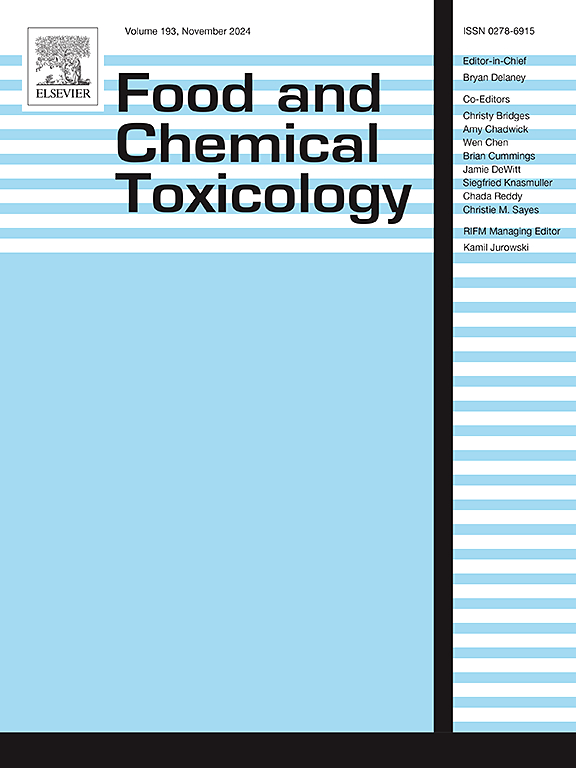锂抑制CD4 T细胞中的Ras-Raf-MEK-ERK信号,损害体液免疫系统
IF 3.9
3区 医学
Q2 FOOD SCIENCE & TECHNOLOGY
引用次数: 0
摘要
锂(Li)是一种广泛存在于人体中的金属。迄今为止,Li对体液免疫系统的影响仍有待确定。本研究以C57BL/6小鼠为实验对象,分别用50或200 ppm的锂处理3个月,用体外Li处理的人外周血单个核细胞(PBMC)。200ppm Li抑制小鼠血清IgG的产生,但不抑制血清IgM的产生;200ppm Li可抑制小鼠CD4 T细胞和B细胞的活化,抑制生发中心的产生。机制上,200ppm Li损伤了CD4 T细胞中的Ras-Raf-MEK-ERK信号,从而抑制了小鼠的体液免疫系统。与此相一致的是,Li对人PBMC的体外处理减少了IgG的产生,但没有减少上清中IgM的产生;Li对人PBMC的体外处理可抑制CD4 T细胞的活化,破坏CD4 T细胞的Ras-Raf-MEK-ERK信号通路。总的来说,本研究表明Li通过抑制CD4 T细胞中的Ras-Raf-MEK-ERK信号通路来损害体液免疫系统,这是Li之前未被认识到的免疫毒性。本文章由计算机程序翻译,如有差异,请以英文原文为准。
Lithium suppresses the Ras-Raf-MEK-ERK signaling in CD4 T cells and impairs the humoral immune system
Lithium (Li) is a metal that broadly exists in human bodies. To date, the impact of Li on the humoral immune system remains to be defined. In this study, C57BL/6 mice treated with 50 or 200 ppm Li for 3 months and human peripheral blood mononuclear cells (PBMC) treated with Li in vitro were used. Treatment with 200 ppm Li suppressed the production of serum IgG, but not serum IgM in mice; treatment with 200 ppm Li impaired the activation of CD4 T cells and B cells, and the production of germinal center in mice. Mechanistically, treatment with 200 ppm Li impaired the Ras-Raf-MEK-ERK signaling in CD4 T cells and thereby suppressed the humoral immune system in mice. In line with this, in vitro treatment with Li on human PBMC decreased the production of IgG, but not IgM in the supernatants; in vitro treatment with Li on human PBMC suppressed the activation of CD4 T cells and impaired the Ras-Raf-MEK-ERK signaling in CD4 T cells. Collectively, the present study indicated that Li impaired the humoral immune system via repressing the Ras-Raf-MEK-ERK signaling in CD4 T cells, which was a previously unrecognized immunotoxicity of Li.
求助全文
通过发布文献求助,成功后即可免费获取论文全文。
去求助
来源期刊

Food and Chemical Toxicology
工程技术-毒理学
CiteScore
10.90
自引率
4.70%
发文量
651
审稿时长
31 days
期刊介绍:
Food and Chemical Toxicology (FCT), an internationally renowned journal, that publishes original research articles and reviews on toxic effects, in animals and humans, of natural or synthetic chemicals occurring in the human environment with particular emphasis on food, drugs, and chemicals, including agricultural and industrial safety, and consumer product safety. Areas such as safety evaluation of novel foods and ingredients, biotechnologically-derived products, and nanomaterials are included in the scope of the journal. FCT also encourages submission of papers on inter-relationships between nutrition and toxicology and on in vitro techniques, particularly those fostering the 3 Rs.
The principal aim of the journal is to publish high impact, scholarly work and to serve as a multidisciplinary forum for research in toxicology. Papers submitted will be judged on the basis of scientific originality and contribution to the field, quality and subject matter. Studies should address at least one of the following:
-Adverse physiological/biochemical, or pathological changes induced by specific defined substances
-New techniques for assessing potential toxicity, including molecular biology
-Mechanisms underlying toxic phenomena
-Toxicological examinations of specific chemicals or consumer products, both those showing adverse effects and those demonstrating safety, that meet current standards of scientific acceptability.
Authors must clearly and briefly identify what novel toxic effect (s) or toxic mechanism (s) of the chemical are being reported and what their significance is in the abstract. Furthermore, sufficient doses should be included in order to provide information on NOAEL/LOAEL values.
 求助内容:
求助内容: 应助结果提醒方式:
应助结果提醒方式:


